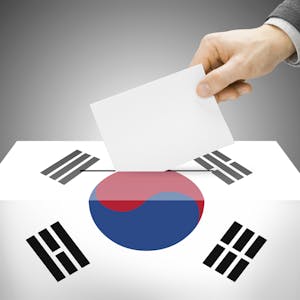Discover the intricacies of Korean politics with "Understanding Korean Politics" from Yonsei University. This course delves into six critical issues, including historical perspectives, democratic transition, political institutions, leadership profiles, the Korean economic miracle, and debates on Korean unification.
Throughout the engaging modules, you'll explore the evolution of Korean politics, the dynamics of democratic transition, the impact of political institutions, and the role of political leadership. Additionally, you'll gain insights into the developmental state and the Korean economic miracle, as well as the complexities surrounding Korean unification. By the end of the course, you'll be equipped to analyze and interpret political developments in South Korea and gain a renewed interest in Korean politics.
Certificate Available ✔
Get Started / More Info
The course modules offer a comprehensive exploration of Korean politics, covering historical perspectives, democratic transition, political institutions, leadership profiles, the Korean economic miracle, and debates on Korean unification.
Delve into the historical perspectives of Korean politics, understanding its evolution and impact on contemporary politics. Explore the first and second republic, military coups, and democratic transitions, gaining valuable insights into Korean political history.
Examine the dynamics of democratic transition in South Korea, focusing on the structures, cultures, and leadership choices that have shaped the nation's political landscape. Gain an understanding of the legacies of the past, authoritarianism, and the prospects for democratic consolidation.
Gain insights into the political institutions of South Korea, from the constitutional foundations to the government structure. Explore the persistence of an imperial president and the debates surrounding new constitutional amendments, providing a comprehensive understanding of political institutions in South Korea.
Explore the profiles of political leadership in South Korea, evaluating figures such as Rhee Syngman, Park Chung-hee, and Kim Dae-jung. Assess the impact of political leadership on the nation's development and discuss the puzzles surrounding their roles in Korean politics.
Gain a comprehensive understanding of the developmental state and the Korean economic miracle, examining empirical evidence and the dark side of policy networks. Assess the limits to the developmental state and its implications for the future of the South Korean economy.
Engage in debates on Korean unification, exploring the overview of Korean division, inter-Korean relations, and the Sunshine Policy. Gain insights into the future of inter-Korean relations and the challenges and opportunities associated with Korean unification.
Anti-Racism is a three-course specialization that equips learners with the knowledge and skills to engage in conversations about race, racism, and anti-racism.
Classical Sociological Theory is a comprehensive exploration of influential sociological thinkers from the 18th to 20th century, offering insights into their theories,...
Global Diplomacy – Diplomacy in the Modern World explores the nature and development of global diplomacy, changes in diplomatic practices, the qualities of a good...
Migrations internationales : un enjeu mondial explores the complexities of global migration, addressing historical, social, and political aspects. It provides a...